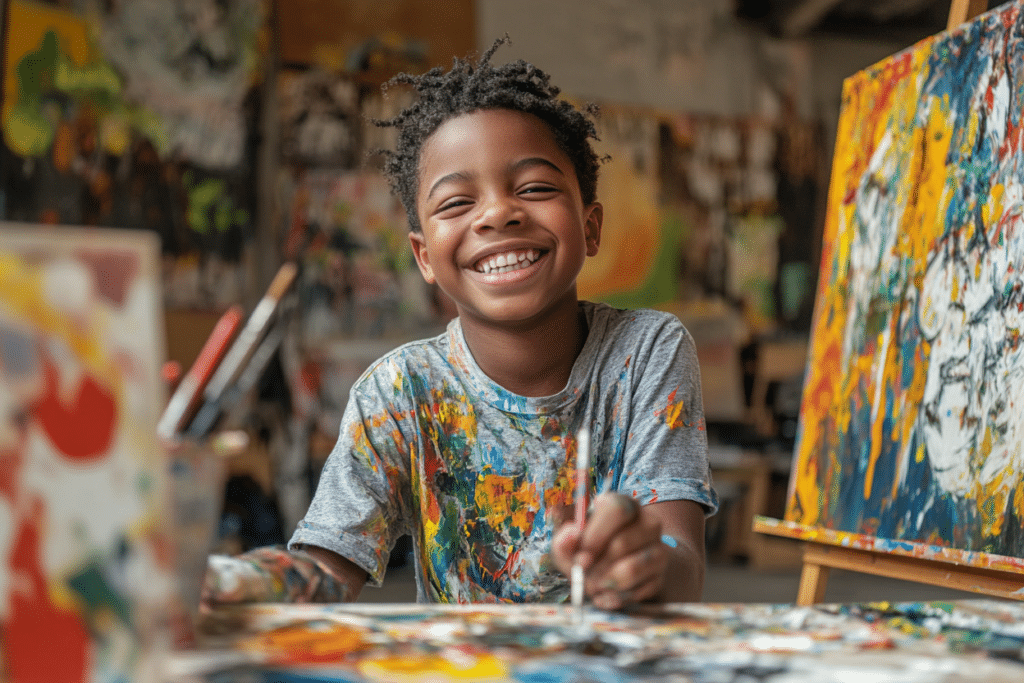Art Therapy
Creating new possibilities through artistic expression

Art therapy is a unique form of therapy where clients use art materials and visual imagery as a form of self-expression, exploration, and vehicle for change. Art therapy can be especially appealing for individuals who find visual expression more effective and comfortable as a mode of communication than verbal language, or for individuals who find their thought processes heavily influenced by visual imagery. Art therapy can be tailored for individuals of all ages. Here are some questions we are often asked about Art Therapy, along with our responses.
Art therapy is the combination of creative expression and psychotherapy. With guidance from an Art Therapist, clients engage with materials and produce art in various forms—for example through drawing, painting, sculpting, collaging, or taking photographs—to explore thoughts, behaviours, and feelings. In creating art and reflecting on the process, clients can gain a deeper understanding about their inner world, about personal goals and challenges, and about next steps forward.
No. Artistic experience or skill is not required to be successful in Art Therapy. The act of creating art—no matter what product is created—is a process for igniting curiosity about thoughts, feelings, and actions that influence all aspects of life. Some forces that shape who we are may be readily apparent to us, while others may reside outside of our conscious awareness. In Art Therapy, artistic endeavors become vehicles for those explorations, with the product that is created being secondary to this larger purpose.
For anyone at any age, Art Therapy can support self expression, personal exploration, and flexible thinking. It can help individuals examine, understand, and re-think actions, emotions, and self-perceptions that affect mental health and daily functioning. Making art can also be a creative and affirming way to practice problem-solving skills and exercise “executive functions”—a set of skills that help us get started on tasks, adjust our approach, manage our frustrations, and get tasks done. Overall, Art therapy can help you or your child explore, challenge, and come to know aspects of the self more deeply. Through artistic expression, new and exciting possibilities are created.
For some individuals, therapies that involve lots of talking may feel limiting or less helpful than sessions with a more visual approach. Art therapy provides a visual language for beliefs, actions, and emotions that may be hard to understand, explain, or explore verbally. Clients who are unsure of where to start in therapy, and who are seeking a less structured approach, can also benefit from the room for creative exploration that Art Therapy provides.
An Art Therapist is a clinician who is trained to provide psychotherapy through the medium of art. An Art Therapist collaborates with clients through the artistic process. The direction of the sessions depends on what a client is seeking. The Art Therapist can invite clients to set personal goals or collaborate on larger themes for personal exploration. The therapist can also provide education around specific subjects like ADHD or Autism, and invite clients to explore neurodevelopmental differences through visual means.
Art therapists use multiple approaches—known as a multimodal approach—to support mental health and promote change. Cognitive Behavioural Therapy (CBT) and psychodynamic approaches are examples of approaches used by Art Therapists. Psychoeducational approaches might also be used to explain how the brain works and how specific strategies can benefit mood, self-perceptions, attention, learning, and daily functioning. Alternatively, a more structured framework can be used in sessions to explore these themes while planning, creating, and completing art projects.
As with any therapy, goals are highly individualized. What motivates one client does not necessarily motivate another. For clients living with ADHD, goals might focus on creating systems to support memory and organization. Other work might focus on mood, perfectionism, and reframing thoughts that are more sabotaging than supportive. Strategies for regulating emotions and enhancing self-awareness might also be explored.
Art Therapy starts with a block of 6 sessions. At a weekly or bi-weekly pace, clients can build a relationship with their therapist, come to understand how sessions will function, and decide how much support is beneficial. Clients often continue after the initial 6-session block on a weekly, biweekly, or monthly schedule, depending on what they find most helpful.
Yes! Art Therapy sessions can be done remotely. A minimal list of art materials will be provided when the first appointment is booked. Clients can bring as many art materials as they choose to each session.
Art Therapy at Possibilities is provided by non-medical health professionals like psychotherapists. As such, these services are not covered by OHIP. Your private insurance plan may cover Art Therapy as a psychotherapy or psychoeducational service.
The cost of each Art Therapy session is $200.
Please check with your insurance provider to determine any coverage. If you are interested in learning more about our payment policies, medical loans for assessments or treatments, or additional funding resources, please read more here. https://possibilitiesclinic.com/payment-policies-fees-faqs/.
The Physician component of this assessment is covered by OHIP for Ontario residents with a valid Ontario health card. A medication consultation with a specialist in treating ADHD is included as part of this assessment.
No. You do not need a referral.
We can help! At Possibilities we offer a complimentary 20-minute session with a member of our Next Steps Navigation Team. Members of this team are professionals from education and healthcare. During this session a member of the Navigation Team will listen to your questions, discuss your concerns, and help you clarify your next steps. If you would like to book an appointment with the Navigation Team, please begin by completing our Intake Form. If you have already completed an Intake Form, please contact us at info@possibilitiesclinic.com or 1-833-482-5558 to request an appointment.
For more information about the Possibilities Art Therapy program, please contact us at info@possibilitiesclinic.com or call 1-833-482-5558. You can also get started right away by completing our Intake Form.


